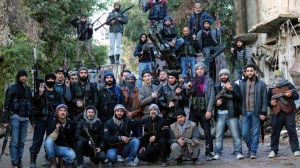In response to the April 24th launch of a national campaign aimed at starting the conversation about protecting young people from the dangers of travelling to Syria by the Metropolitan Police, Jill S. Russell discusses the role of academia in such initiatives, while Joana Cook analyses the implications of focusing on women.
Not the wrong people for Counter-Radicalisation and British Jihad
By Jill S. Russell:
The Senior National Coordinator for Counter Terrorism policing, Deputy Assistant Commissioner, MPS, Helen Ball unveiled an effort to enlist the support of female family members to stem the flow of British fighters to Syria. Within minutes of the announcement, our own Shiraz Maher critiqued the policy in an interview on BBC Radio 4, noting that the police were “the wrong people to be launching this type of campaign.” Citing concerns regarding community fears of criminalisation and the legacy of previous aggressive approaches by the police on this issue, he argued instead that this should be a matter for community and government leaders. While I understand the concerns, and I have no illusions regarding the tensions in Police-Community (“Po-Co”) relations in the target audience, to make the first and most quotable response to this effort a ringing negative serves little policy purpose.
Many areas of academia enjoy the luxury of operating beyond the constraints of real life requirements. However, in War Studies, particularly as it is so broadly conceived here at King’s, the relationship with policy and policymakers is a critical component of our work.
As I watched the news of this effort emerge this morning I was intrigued. I have speculated with colleagues regarding Po-Co relations generally that an appeal to the female community structures – mothers, aunts, grandmothers, sisters – and the development of trust between them and the police could serve well to counter many areas of criminality, particular amongst at-risk youth. As I see it, such an approach would provide a more productive, less confrontational means to interact with the community to the benefit of all in the reduction of violence and crime. And so, for policing I think this is a useful first step. More than that, I appreciate the philosophy that stands behind such efforts. In a world where responses to crime, violence and the use of force are increasingly forceful and kinetic in their own right, policies and tactics which rely upon alternative foundations, which eschew escalation, which are cognizant of the alienation caused by “robust responses,” are as valuable as they are rare.
I do not doubt that the details of the critique are correct. I agree that the police will have struggle to implement the policy. And hence it is our responsibility as scholars, as keen and intelligent observers of these issues and events, to offer not simply a critique of the efforts of the institutions with which our work is associated. Rather, if we are not to be ivory tower naifs and empty critics, then we must consider our commentary wisely and correctly. If the police have not quite perfected the implementation of the current tactic – and I suspect that it is entirely true – then we should offer our own insights in remedy. I also worry that to highlight the distance between the police and community as a reason not to pursue the effort simply hardens the divide. Thus, to dismiss the entire effort because of its defects serves little purpose, except perhaps to alienate the police from academia.
British policing has taken an interesting and innovative step today. It is a possible bridge to improved relations between the authorities and critical communities. We in academia could offer much in the way of expertise to improve the likelihood the effort to succeed, which would serve not only the direct security needs but also the more general issue of how the police interact with society. Unless our purpose is to maintain the discord and distrust, then it is incumbent upon those of us in relevant scholarly endeavours to offer our wisdom in support.
_____________
Jill S. Russell is a regular contributor to Strife, Kings of War and Small Wars. She is currently a doctoral candidate at King’s College London, researching military history. You can follow her on Twitter @jsargentr.
* * *
What’s in a word? How the Mets appeal falls short
By Joana Cook:
Today the Metropolitan Police announced a new appeal in its counterterrorism focus, which urges women to dissuade family members from travelling to Syria. What this appeal has acknowledged is the important role that women can play in this, and why they should be part of the broader security conversation. Where the initiative has failed however, is by framing women as unique actors separate from those in the family or wider community as opposed to integral actors within, and excluding the roles that women may have in this extremism itself.
The Met’s announcement (in unspoken terms) acknowledges that there are unique, complex threats emerging, and that traditional, law enforcement methods previously engaged to counter extremism and terrorism are not enough. Gone are the days when threats could be seen and dealt with as emanating from abroad, amongst those of different unfamiliar backgrounds and value systems, rather than from our own (families) backyards. The issue of foreign fighters is more personal and is being demonstrated and appealed to by the police in a much more familiar way as the language engaged shows by tying this issue to our everyday lives. This is a ‘proactive measure to keep families together’. They are ‘idealistic young people not would-be terrorists’ who, if they travel to Syria even for humanitarian reasons ‘risk being preyed on by terrorist groups’ and ‘we are trying to protect them’. We are ‘encouraging women to take an active part in their child’s lives’. This is as personal as targeted messaging gets.
The efforts that the Met are taking have both positive and negative ramifications. They humanize and personalize those (our children, our husbands) who may become foreign fighters and indeed threaten our safety, and appeal to the different ways we may be involved in preventing this. They engage us as citizens in the security process as well as positively target early stage intervention, showing an understanding that motivations to become involved in certain activities may be carried out under misguided youthful ambitions (even if for the right reasons), and proactive actions can prevent future tragedies and more reactive, serious consequences which may face these individuals we care about in the future. However, what the Met risks doing by specifically targeting women as mothers and wives in the Muslim community and appealing to their roles as intimate family members, endangers alienating the important roles that others may play in this same process. It also suggests that it is only young men which should be focussed on in these efforts.
When singling out certain groups (women, Muslims) and focusing on their capacity in the family, the Met risk reducing the roles that women may play to the private sphere and ignores others they may play as, for example, teachers or community leaders who may also have influence over these youths lives. Without stating in the same breath that all family members, including fathers, husbands and brothers, also have a critical stake in this as well, may unintentionally delegate these figures to seemingly less significant, impactful roles. By pointing out that the nurturing and safeguarding roles that mothers can play in preventing their sons (and daughters) from becoming foreign fighters risks side-lining other components that are present in this radicalisation process which families may also have a stake in, some of which may not be solved simply by a mother’s love.
The impacts of foreign fighters from Syria have been said to last the next decade and have the potential to cause severe security implications throughout. What today’s initiative has acknowledged is that this is an issue we should all be concerned about and have an interest in addressing.
Women, as mothers, sisters and wives, have important roles to play in this. What should not be forgotten however, is that not only can these same women we are appealing to in fact support or carry out these extremist activities themselves as recent cases have shown, but both men and women, Muslim and non-Muslim, within the family and community, all have positive and varied roles in countering this. These should not necessarily be singled out as disparate and the language used in such initiatives should reflect this.
_____________
Joana Cook is a PhD student at the Department of War Studies at King’s College London researching the role and agency of women in counter-terrorism in Yemen. She is also a researcher at the Canadian Network for Research on Terrorism, Security and Society (TSAS). You can follow her on Twitter @Joana_Cook

